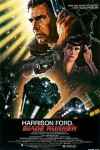Several years ago my sweetie-wife made the 5 disc Blade Runner DVD set a Christmas gift for me – that was before my Blu-ray player – and whenever I watched Blade Runner I have to select which Blade Runner as I going to watch, More often than not, like last night, I end up watching Blade Runner – The Final Cut.
DVD set a Christmas gift for me – that was before my Blu-ray player – and whenever I watched Blade Runner I have to select which Blade Runner as I going to watch, More often than not, like last night, I end up watching Blade Runner – The Final Cut.
Blade Runner in 1982 was the second SF film from visionary director Ridley Scott. It had a troubled release, first suffering from a studio imposed voice over that the director had not intended and second from a final edit that was again taken over the director’s wishes. The film fared poorly at the box office and vanishes quickly.
That however was not the end of the story. A dedicated underground fan base has a passionate interest in the film, keeping ti alive on the home video market, and production design influence everything from music videos to Christopher Nolan’s Batman begins, A work print surface, and the interest on Scott’s vision exploded, leading the studios to release a director’s cut, now minus the offending voice-over. When it came time for the DVD/Blu-Ray big release, Scott was allowed to digitally repair shots he had always intended, creating what is know as the Final Cut.
When it was released in 1982, Blade Runner’s start, Harrison ford, had just exploded as the action star of the 80s. People flocked to the film expecting an action-adventure story much like Ford’s other work, but that is not what this was ever intended to me. The story of a cop charged with killing biological robots know as replicants, tormented by the very humanity he is destroying, Blade Runner grapples with life, death, and what does it mean to be human. This somber and dark film with its cynical viewpoints contrasted greatly with the feel good genre film of that year and it took years to be understood.
And I am not sure it is understood now. Last night I watched the film and I came away with two new observations.
First, Harrison ford’s character Dekker is strangely ineffective in the films resolution. As a protagonist we the audience would expect to force the resolution, but it is not Dekker but the villain Roy batty who resolves the films central plot, and resolves it in a whole non-villainous way, choosing to die rather than kill, when that is all he has done until this defining moment.
That leads to the second observation; perhaps Dekker is not the protagonists of the story. Perhaps it is Roy Batty and in effect the entire movie could be view in a wrong way around fashion, where Dekker is the villain, in implacable foe killing off the heroes one by one. Roy, driven over the edge my his impending death nearly kills Dekker, but in the end he sees that all life has meaning, even that of his enemy, and at the end of his life Batty finds grace and redemption.
This is a favorite film of mine and one that constantly provokes interesting thought.
